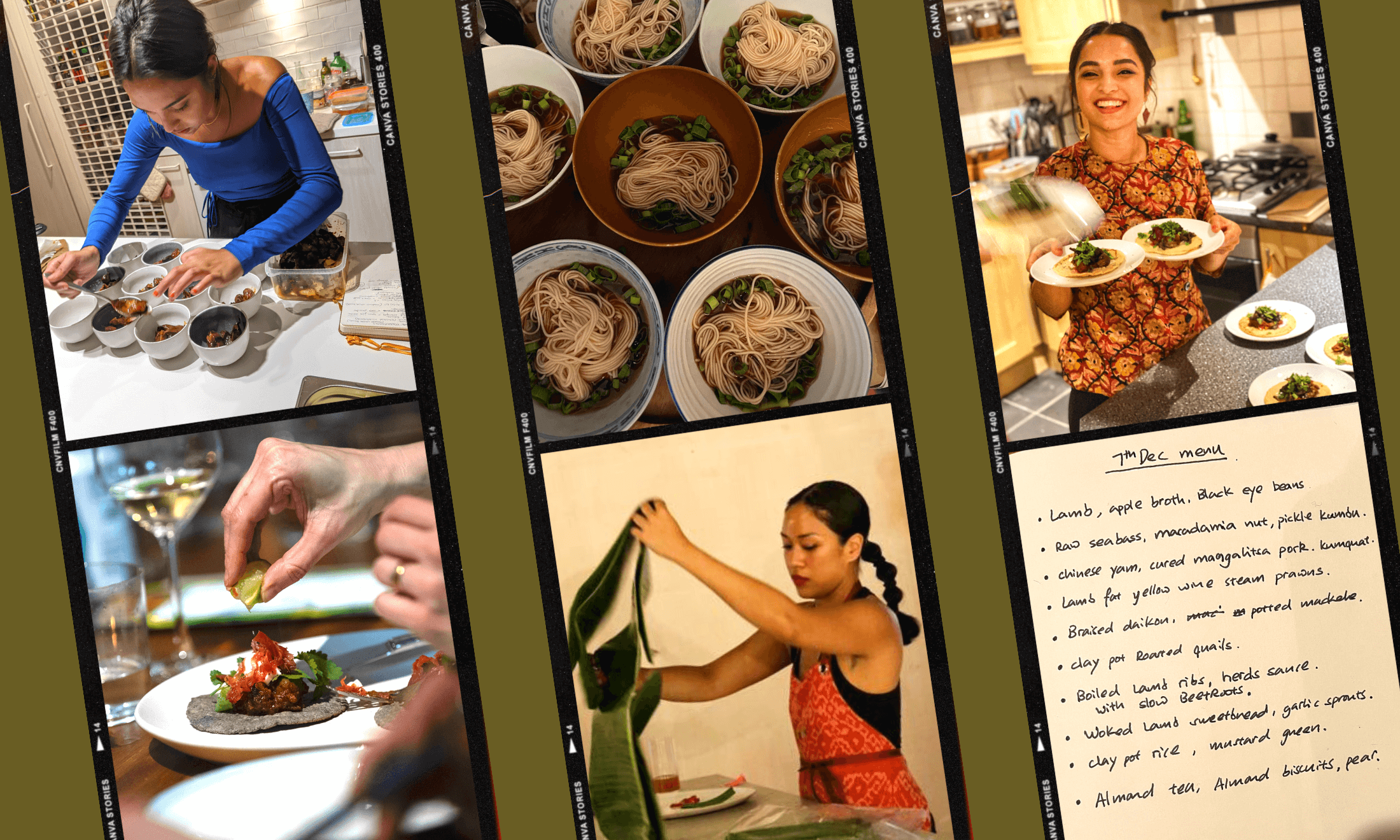
Indomie, myself & I: how the cult noodle brand has shaped our lives
After the passing of Indomie's mi goreng creator, Nunuk Nuraini, three writers reflect on what the iconic noodles mean to them.
Simar Deol, Funmi Lijadu and Maz Do
11 Feb 2021
It’s been a sad few weeks for noodleheads all around the world since news of Nunuk Nuraini’s passing has come to light. The iconic founder of Indomie’s popular mi goreng noodle has died aged 59. Since then, many have taken to social media to pay tribute to the Indonesian recipe developer who worked at the company for nearly 30 years.
To celebrate the founder’s life, we asked three writers to reflect on how the noodles have come to shape their lives:
Indomie reminds me of my first love
At age 16, I made the chaotic decision of leaving the comforts of my family home in New Delhi and moving to a small, eccentric boarding school nestled along the coastline of south-west Wales. In the excitement of my newfound independence, I failed to prepare myself for a couple of things: making new friends at the peak of my teenage angst, the tasteless mush my school served for ‘meals’ and the wet, windy, Welsh weather. I missed home and I desperately craved comfort – in the form of something warm and spicy.
In walked in James – a high school crush I will never forget – with suitcases full of Indomie he brought from his home in Singapore. From the very first slurp, I was hooked. The tangy, spicy, saucy noodles that took less than three minutes to cook and five minutes to devour came to define my time at school. It was reminiscent of my younger Maggi noodle days – cooked with love, by mum – but something about it also felt distinctly adult. Maybe it was thinking I was falling in love as I watched James teach me how to prepare the noodles Singapore style (fried egg on top) or maybe it was just using the hob without the presence of my hovering mother.
“From the very first slurp, I was hooked. The tangy, spicy, saucy noodles that took less than three minutes to cook and five minutes to devour came to define my time at school”
Unsurprisingly to anyone who knows me (and my ramen addiction), most of my school memories involve instant noodles. I remember walking home from the pub with my mates, drunk on vile drink concoctions (cranberry amaretto anyone?), and begging James to spare one packet of Indomie for the six of us to share. We sat down for a steaming bowl while—rustily— flirting with each other. I remember when my best friend snuck into his room and stole his Indomie stash as revenge for when he cheated on me. Begrudgingly, I also remember wallowing in my heartache, rewatching Gossip Girl while slurping soupy Indomie in bed. Soupy Indomie is controversial, but I stand by it.
It’s been more than eight years since I left sixth form, James and (mostly) Indomie behind. While ramen remains my emotional crutch, I can’t look, smell or taste Indomie without being transported back to my cringe-worthy adolescent years. While I don’t miss the crippling insecurities that come with being sixteen, I definitely miss the part of my life in which everything could be resolved with a blissful bite of Indomie.
by Simar Deol
To Nigerians, Indomie is a popular cuisine that cuts across the class divide
Indomie instant noodles were introduced to the Nigerian market in the 1980s and hold a fascinating place in the diverse culture of Nigerian cuisine. This Indonesian brand of instant noodles has cut across Nigeria’s sharp economic divide and you can get a single packet of the noodles for 100 naira – about 20 pence. And, last October, a government-affiliated company stocked Indomie packets as part of their COVID-19 food parcels for those in need of support.
But Indomie’s affordability and simple preparation only scratches the surface of its cultural meaning. From childhood, it was clear that my household’s love for Indomie was not unique. The noodles continue to be an unpretentious delicacy in many homes across the nation. In my primary school in Lagos, people would pack Indomie noodles in their lunchbox, happy to eat it cold!
“As a dynamic people, Nigerians have transformed Indonesian instant noodles into a matter of personal identity”
Instant noodles may seem simple and unremarkable, but their simplicity is key to their appeal. They provide space for varying textures and flavours and can often become the base of very inventive and experimental dishes. Generally, the culinary culture around Indomie represents the versatility and inventiveness that defines the Nigerian spirit. As a dynamic people, Nigerians have transformed Indonesian instant noodles into a matter of personal identity.
For me, Indomie is both a savoury genius and a comfort food. The chicken, onion and chicken pepper soup packets have always been favourites and cooking them requires minimal fuss, but delivers maximum flavour. In Nigeria, they’re commonly topped off with sides like drumsticks and fried plantain.
Many also enjoy the noodles spicy, seasoning them with chopped scotch bonnet peppers, commonly known as ‘ata rodo’, ensuring a burst of fiery flavour with every bite. The tangy seasoning broth is sharpened by the satisfying kick of the chillies. The resulting aroma and taste is an indulgent and distinct flavour, making Indomie a staple for many Nigerians at home and abroad.
by Funmi Lijadu
I’ve been eating Indomie since I was four years old
At every stage of my life, I’ve been able to rely on Indomie to bring me some sense of stability, even equanimity. Some of the first memories I have are those of me eating Indomie’s mi goreng.
I remember being four years old, sitting on the floor of my Aunt Lily’s sweltering kitchen in Australia. My mother feeds me noodles from a bowl. I scream that they’re too spicy, but also refuse to eat anything else. She hustles back to the kitchen – “I swore I didn’t add the spice packet,” she mutters to my aunt – and makes me a new dinner. Four bowls later and the whole apartment is fed with my leftover noodles, thus solidifying those early connections I made between mi goreng, family, comfort and gratification.
I wonder what it says about me that I tie such personal feelings so closely to a brand. I count its success – global, record-breaking sales, a mind-boggling 72% share of Indonesia’s instant-noodle market – as my own. Ordinarily, my jaded frame of mind would attribute all that to good branding. But no one’s ever had to convince me I need more mi goreng; I do a good enough job of that myself.
“Mi goreng feels attuned to some primal, Pavlovian part of my brain which craves a bouncy noodle, a deeply sweet-and-savory sauce”
Most young people associate instant noodles with fraught (and often broke) periods of their life. But for every time I’ve had mi goreng hungover, or while cramming to work behind a deadline, there’s a time I’ve chosen it for dinner (two packets, with garlicky bok choy and a fried egg), eaten it grateful for God’s culinary instinct. Mi goreng feels attuned to some primal, Pavlovian part of my brain which craves a bouncy noodle, a deeply sweet-and-savoury sauce.
I share it like I share a juicy secret; only to those I deem worthy, and as a sort of litmus test of compatibility. Every best friend I’ve had has eaten it bowlfuls at a time. My partner has helped me take glamour shots of the noodle to accompany an adulatory article I wrote on my favourite food. He agrees – mi goreng is king. When people enjoy mi goreng, I feel a sense of acceptance, even assimilation.
Food has felt like a relatively safe space to broker identity. But in the age where so many Asian foods are decontextualised and made palatable to white audiences, I feel especially protective over mi goreng. It seems silly to say that when millions consume mi goreng per year, all over the world. However, in the wake of Nunuk Nuraini’s passing, the genius woman behind this glorious product, I’m reminded, by sheer force of numbers, that I’m not alone in celebrating this pride and raising a bowl to her name.
by Maz Do









